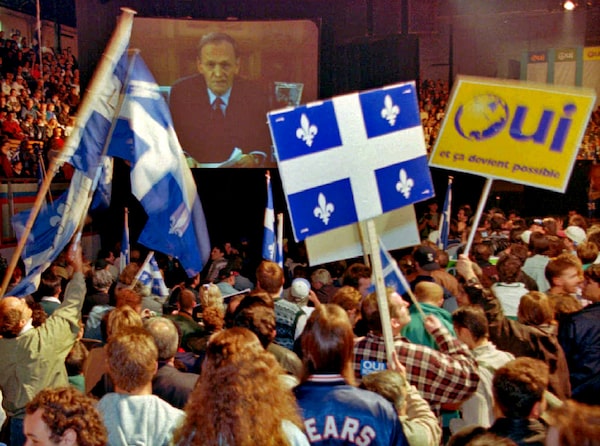
A crowd of Yes supporters wave Quebec flags as the nation-wide address by then-prime minister Jean Chrétien is played live on a giant screen, on Oct. 25, 1995, in Montreal.Paul Chiasson/The Canadian Press
English Canadians woke up on Halloween Day in 1995 afraid for their country. The “no” side had eked out a razor-thin win in the previous day’s referendum on Quebec sovereignty, but no one considered the result a victory for federalism. Canada was hanging by a thread.
“Whatever the method, change must come, as the Prime Minister and other leading federalists promised explicitly during the campaign that it would,” the day’s lead editorial in The Globe and Mail insisted. “Canada cannot simply ignore the threat of nearly half the citizens of its second most populous province to leave the federation.”
Yet, that, in essence, is exactly what happened. While symbolic gestures were made under prime ministers Jean Chrétien and Stephen Harper to recognize Quebec’s distinctness, none came close to meeting the province’s historical demands for special status in the Constitution.
Twenty-five years onward, those demands are still on the books, officially anyway. But few francophone Quebeckers spend their lives worrying about them. They remain as attached as ever to their language and culture, as ferociously protective of their unique identity. But most “yes” voters abandoned long ago the dream of a separate country. Those who are too young to remember the 1995 plebiscite have embraced different political causes altogether.
Canada has survived. Quebec has continued to evolve, even thrive, within the Canadian federation. The Parti Québécois is basically a fringe party, with only nine seats in the 125-seat National Assembly and barely half of the 73,000 members it boasted just four years ago.
Maybe Mr. Chrétien was right, after all. A federalist hardliner from the get-go, he kept on insisting average Quebeckers did not “give a damn” about a distinct society clause. It was only in the dying days of the referendum campaign – as the “yes” side was showing momentum after designating then Bloc Québécois leader Lucien Bouchard as its chief negotiator with the rest of Canada – that Mr. Chrétien went on television to promise Quebeckers change. History shows he never intended to deliver on that promise. He never had to.
After the referendum, Mr. Chrétien stonewalled Mr. Bouchard, who had taken over as Quebec premier from Jacques Parizeau. The latter had resigned in disgrace after bitterly blaming the “yes” side’s narrow loss on “ethnic votes” and illegal campaign spending by the “no” forces. Mr. Bouchard eventually gave up the fight, quitting politics altogether in 2001.
It was all downhill for the PQ after that. Under Pauline Marois, the party managed to win a minority government in 2012 with 32 per cent of the popular vote. But that was not so much a victory for the PQ as it was a loss for Jean Charest’s Liberals, who had been mired in scandal after nearly a decade in power. Ms. Marois fatefully recruited businessman Pierre Karl Péladeau to run in 2014, only to blame the PQ’s loss that year on PKP’s over-enthusiasm for un pays.
Mr. Péladeau had a brief and undistinguished turn as PQ leader after that. He was replaced in 2016 by journalist Jean-François Lisée, a former adviser to Mr. Parizeau and Mr. Bouchard, who vowed a PQ government would not hold a referendum during its first mandate. Voters yawned. The PQ had its worst electoral result ever in 2018, winning just 17 per cent of the vote.
Earlier this month, the PQ chose its fourth leader in six years. Barely anyone noticed. Even Le Devoir, the nationalist daily where I worked as a political reporter in 1995 and still write a weekly column, did not deem Paul St-Pierre Plamondon’s election worthy of its front page.
And why would it? The PQ is the fourth party in the National Assembly. The governing Coalition Avenir Québec, under former sovereigntist and PQ cabinet minister François Legault, has found a sweet spot among the francophone electorate with its soft-nationalist messaging. A Léger Marketing poll this week pegged the CAQ’s support at 50 per cent overall, and 60 per cent among francophone voters, leaving the Liberals, PQ and Québec Solidaire to fight over the crumbs.
“This dream is not dead,” Mr. St-Pierre Plamondon said of sovereignty in his Oct. 9 victory speech, pledging to “rebuild the ‘yes’ side.”
Few would bet on his success. The generation that founded the PQ is dying off. And young francophones do not share its sovereigntist dreams. But who is to say the next generation won’t? That the unfinished business of 1995 will not come back to haunt us?
“Calmly, carefully, we must press on with renewing federalism and find a formula around which all Canadians can gather,” The Globe declared in its post-referendum 1995 editorial. “Canada came within a whisker of disaster yesterday. Let us make sure it never happens again.”
We have not done that yet.
Keep your Opinions sharp and informed. Get the Opinion newsletter. Sign up today.
 Konrad Yakabuski
Konrad Yakabuski